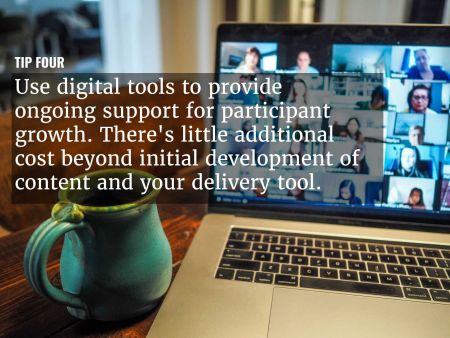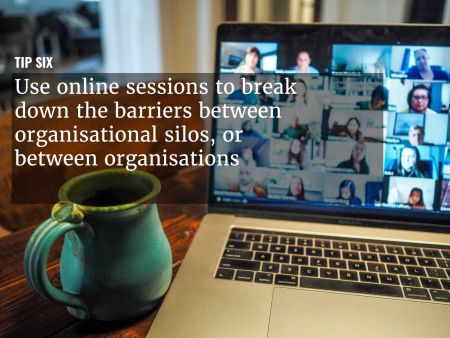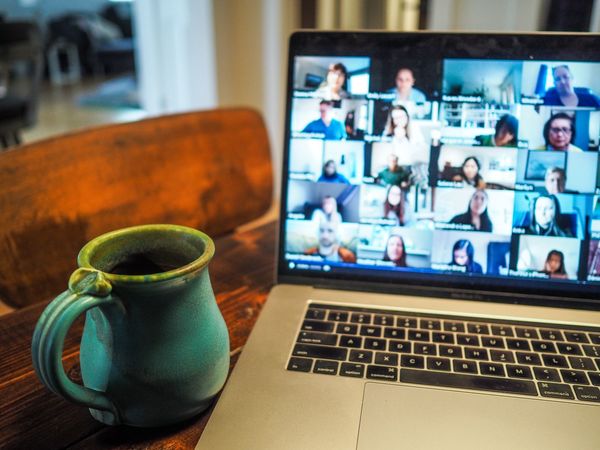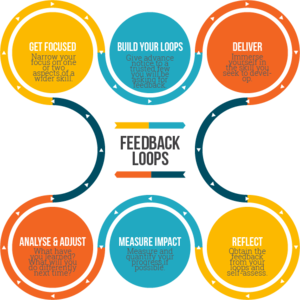In response to the pandemic, we transformed our flagship workshop, Mastering Expertship, from a 4.5 day in-person event to a series of eight online workshops.
Here’s six tips we learned during the process that will help turn your multi-day workshop into a series of successful online learning events.
Before we start - what we already knew
HFL’s has offered our Fastlead coaching program online since 2017. So before we started working on Mastering Expertship online, we had already learned three important lessons:
-
It’s a lot of effort to make learning work virtually. You can’t offer the same content and approach online that you have in a workshop.
-
Sessions need to be shorter, because Zoom fatigue is real.
-
Any learning you offer online has to be supported by pre- and post-work. Otherwise learning is not embedded.
We’ll discuss those issues in more detail as we work through the six tips for delivering successful online workshops.

Tip one
Play to the strengths of online. Participants retain information more effectively from online episodes than they did from long-in-person sessions
HFL, Expertunity and Fastlead use approaches called “small group coaching” and “episodic learning”. Summarised, we coach in small groups of three to five people, with a learning episode every fortnight, or every few weeks.
Here’s the good news: episodic coaching is actually better than long workshops for training and coaching. Multi-day workshops ask participants to learn 20 skills, 13 of which they will forget on their ride home.
Two-hour episodes, meanwhile, focus the participant’s attention wonderfully on a single topic, and the coaches’ attention on how they can most effectively coach and reinforce skills related to that topic.
Then once the episode is done? The participant can immediately try out the skills they’ve learned at work. This is a huge benefit to episodic learning: new skills are tested and embedded immediately. This also makes it more likely a participant’s manager will help them embed skills – we’re asking them to support only one set of skills per episode, and it’s easier to find opportunities to embed one set of skills than multiple sets.
ADVANTAGE Participants learn more, and can try out new skills when they’re fresh DISADVANTAGE Multi-day workshops can be transformational because you have very extended time to work with participants to transform their behaviour and attitudes. QUESTION Our two-hour learning episodes are very practical, with a lot of real-play and discussion. Participants often ask if it’s possible to have longer two-and-a-half or three hour sessions to allow even more discussion time.
Tip two
Make online workshops more effective by shifting reflecting and reading offline
To keep short, episodic learning sessions effective, we recommend three actions:
Before your program begins, post your workbook as a physical book to participants. Don’t worry that participants will read through the workbook before the program starts.
They might, but the workbook should represent only a small part of the value of group discussion and real plays. It’s a short cut to participants who notating a model, or answering questions in writing. Seeing models or questions beforehand does not detract from the surprising directions in which in-session discussions will run.
Move all reading, set up documents for real plays, and any deep reflection exercises into “pre-work”. Deliver this material digitally at least a week before your session.
We recommend keeping the total pre-work under 20 minutes to ensure it is completed. No participant will argue they can’t fit 20 minutes of prep into the fortnight between sessions, but they will argue about an hour.
Deliver post-work digitally, immediately after the session. In our case, we usually ask Mastering Expertship participants to update their personal growth plan, but post-work can also include reflection on how the participant’s organisation approaches a topic, or brainstorms for ideas to better approach that topic.
ADVANTAGE Participants start individual sessions knowing how it relates to their work, and personal growth plans help embed knowledge between sessions. DISADVANTAGE We built out own learning content management systems that can deliver content via email at specific times, but this is not an option for everyone. Where that’s too expensive and time consuming, and you don’t have large numbers of participants, you can manage this process by hand. QUESTION How do you provide additional follow up material for participants who feel they wanted more than a two hour session?In our case, we maintain a tagged library of recommending reading and viewing: high-value magazine articles and online video that’s available to all participants and program alumni.

Tip three
You can use episodic learning to provide a personalised learning journey
A long workshop has a set design: the day starts, learning happens in a specific order for the entire group, the day ends.
Episodic small-group coaching can be much more personalised than that. If one group wants to undertake episodes A, C, F and G, another can just as easily run A, C, B and E.
We recommend setting one or more mandatory topics (Fastlead has one, Mastering Expertship has four), and we also let clients request that all their participants complete an additional topic or two.
Beyond that, we recommend participant groups are encouraged to choose the topics they feel they need to study most urgently.
It won’t surprise you to learn that participants love that approach. It’s also lets HR teams (and participant managers) enforce consistency of skills across an organisation by specifying the correct mandatory learning.
ADVANTAGE Participants love this approach. HR teams can enforce consistency of learning across the organisation. DISADVANTAGE Participants usually want a larger number of topics than they’re offered. This can be ignored, or the request fulfilled – but that increases coaching costs. QUESTION How do you determine which topics should be mandatory? In Mastering Expertship, we make the first four modules mandatory because they “scaffold” the rest. They introduce core models, ways of thinking and behaviours that the participant will refer to through the program.
Tip four
Use digital tools to provide ongoing support for participant growth. There’s little additional cost beyond initial development of content and your delivery tool.
The output of many HFL programs is the “personal growth plan”. In Mastering Expertship, this is an action plan first drafted at the beginning of the workshop, in response to our Expertship360, a 360 review for technical specialists. Through the workshops, this plan is kept continually updated.
On a four-and-a-half day workshop, that plan was kept on paper. In a virtual workshop, the action plan is kept online.
This may sound like a minor improvement to efficiency, but it’s more significant than it first appears. We wrap all program material, including the Expertship360, growth plan and participant learning through the program, into a digital service that functions as a “memory box” of new skills.
There’s a lot of value in having a single interface that offers the participant their responses to questions, models they have filled in, brainstorming ideas and other material. On its own, that is deeply useful to a participant reflecting back on a program afterward.
But digital capture of learning has two additional benefits:
-
First, it can be made interactive, asking the participant to keep learning (even a short quiz, a week later, will aid retention of new skills).
-
In addition, that learning can be extended beyond the formal end of a program, delivering a series of ongoing challenges to keep the participant’s skill sharp for a year or longer after a finish.

Tip five
Episodic learning suits busy executives and experts. And small groups encourage introverts to contribute.
Technical specialists and other experts are busy, even those who aren’t more or less continually on call. It is unlikely – they would say impossible – that they can find a way to spare four and a half days for a coaching program, however much they like the idea of the program itself.
Episodic coaching in short sessions eliminates that problem. It suits busy experts, or store managers, or middle management, or board members – everyone, really, who resists taking more than 2 hours out of the office.
In addition, small groups make more space for introverts to contribute, where larger, longer workshops favour extroverts who don’t flinch at addressing a large group.
ADVANTAGE Workshops have never been idea for very busy people or introverts. Small groups and episodic, online learning are more appropriate coaching mechanisms. DISADVANTAGE Where introverts find large crowds and workshops draining, extroverts find online sessions hard work. Be sure to keep session highly interactive to retain their attention. QUESTION If we ever return to offices full-time, extroverts are likely to be keen to return to large in-person workshops. Will introverts, who’ve had a great time in small online sessions, agree? We’re not sure.
Tip six
Use online sessions to break down the barriers between organisational silos, or between organisations
Should your invite only your own staff to an online coaching program?
The in-person Mastering Expertship ran in two ways: either as an in-house session for staff of a single organisation, or as a “public course”. Participants could join from any organisation so long as they were not a competitor of a group already taking part.
If it’s possible for your coaching, we strongly encourage the public approach, or at the very least that you mix participants from different silos in your organisation.
It’s a terrific way to expose participants to issues faced by other parts of your organisation, and it will help participants form a network of useful contacts across their industry (or organisation).
ADVANTAGE Participants build real camaraderie with other members of their course; don’t lose the opportunity to spread connection across your organisation or industry. DISADVANTAGE For internal programs, while it’s easy to invite external participants, it won’t always make sense to do so (and obviously you can’t train sensitive internal matters in a public program). QUESTION Does your organisation have partners, suppliers or customers who presence would make sense in your virtual coaching?What now?
Small group coaching and episodic learning are two parts of a more effective online learning process.
We’ve suggested ideas in this article that are not always easy for small L&D and OD teams to implement, especially if you don’t have in-house technical developers to help with digital delivery.
At the same time, virtual small group coaching and episodic learning don’t have to be entirely digital.
In a pandemic period, it makes sense to break up one or two day workshops into smaller virtual sessions, and the administration workload remains reasonable if you’re managing small numbers of participants.
Further reading
If you’d like to read more about how episodic learning and small group coaching works, here’s some additional resources:
13 rules for small group coaching. A manual for creating your own small group coaching process. “13 rules” distills our experience running hundreds of small group episodes for Fastlead, and goes deep into questions like “how many participants should I have?” and “What rules of engagement should I adopt?”
The Fastlead homepage shows how we broke down a coaching program for frontline leaders into episodes.
The Expertship homepage shows the same breakdown for Mastering Expertship - our program for technical specialists to develop the qualities they need to run business as usual, and lead projects, ideas, and innovation.

(Experts have a complicated range of responsibilities. If you’ve ever wondered why they’re so hard to hire, and even harder to retain, download the first chapter of our book How to be a Master Expert to find out more.)
And finally, if you’d like to transform your technical experts into organisational superstars, we recommend you download our guide to the Mastering Expertship program using the form below.
That explains how the new, episodic version of Mastering Expertship can make your expert teams far more effective, ambitious - and happier! – as well as improving your expert team ROI.




